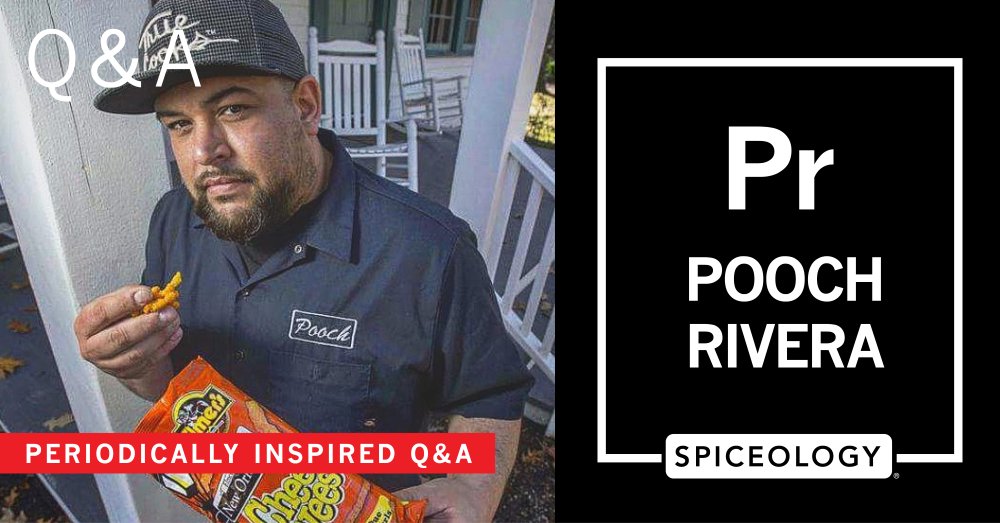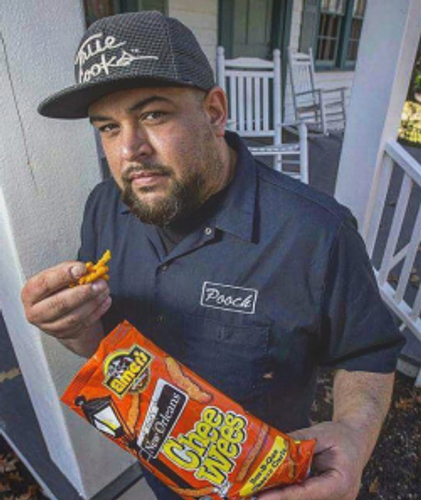
Don’t let his cutie Instagram handle of @foodiepatutie fool you. Chef Sean Rivera cut his teeth in the New Orleans culinary scene, working his way up the line, opening restaurants, and now after almost 25 years he’s one of the most well-connected, celebrated and respected chefs in the state of Louisiana.
Known as Pooch to friends, family and everyone else, he’s also been named Pit Master Champion by the Culinary Fight Club, a Chef to Watch and Best Chefs of Louisiana by Louisiana Cookin’ Magazine, Co-Host of the Walk-In Talk Podcast, plus a Creole Culinary Ambassador of Louisiana.
We caught up with him for our Periodically Inspired chef Q&A series that takes a deep dive into a chef’s story and inspiration. Check out the full interview below:
Chef, restaurateur, entrepreneur - what’s your favorite role right now?
“As cliche’ as it may sound - it's being a dad. Because I have finally made it to that pinnacle in my career.
I’m loving being a consultant right now. I always wondered how to make that transition into being a consultant and then one day the phone just didn't stop ringing and people were asking ‘hey, what do you think about this and how much would you charge?’ And just like that - I started being a consultant.
It's all about being able to build relationships. Normally, chefs are back of house and looking at four walls, and every once in a while they're greeting tables. Now, I find myself in a position to polish those longstanding relationships I've cultivated, sharing ideas, and providing consultation where needed. It's a great feeling. It’s freedom, and I wish that for everyone.”
Talk about your relationship with Cajun / Creole cuisines.
“At a certain point when you’re growing up in New Orleans - it’s all you know. Even school lunch was red beans and rice, gumbo, and etouffee. You’re so immersed in Cajun and Creole culture that you don't even realize that there are other cuisines and cultures out there.
But once you start studying Louisiana cuisine you realize it's a culmination of every cuisine and culture that's ever been introduced into the United States via the mouth of the Mississippi River. It’s an enlightening experience and a great journey seeing how far these cuisines have influenced what people make.
There’s a fine line between Creole and Cajun, and yet there's also a huge gray area between Creole and Cajun. One of the things that I love the most is realizing that the French influence on cooking is just part of a larger story. You have people from the Caribbean, West Africa, Germany, Italy, Spain, Ireland, other European countries, and most importantly the Indigenous people that settled into Louisiana - primarily New Orleans - and influenced so much. They each brought their own traditions, ingredients and skills. There’s a lot of cross-pollinating and melding of cultures.
Take Andouille Sausage. It is a Bavarian sausage that the Germans brought here, but they taught the French how to make this sausage. The French had access to sugarcane and pecan plantations. Once they removed the cane juice to make sugar, they’d take the spent sugar cane and pecan shells and use that mixture to smoke the sausage. The Germans never really got credit for that - the Bavarian sausage took on a new life as Andouille sausage.
Right now we’re in a new evolution of Creole cuisine. For the last 50 years, Louisiana has had an influx of different immigrants, including Vietnamese, Palestinians, and Hondurans who are working in many of the kitchens in New Orleans and Baton Rouge. Julio Machado is living the American Culinary Dream. He came here avoiding communist prosecution in Venezuela, and I've never seen so much talent in the kitchen - he makes us all have to step our game up. This new generation of chefs are taking in the current style of Louisiana cuisine and then adding in their own cultural flair - and in turn evolving into the new guard of Creole cuisine.”
What are your favorite aspects of Creole and Cajun cuisine?
“I love Cajun cuisine because it was about living off the land. I love that it is about simplicity in everything. It's usually a one-pot dish, but for me that makes it kind of intimidating because if I mess it up, I can't fix it since I’m only doing it that one time. You have that one shot to do it the right way. But once you master Cajun cuisine, you realize how simple it is - and that's not a knock at it. But it's so simple that it's intimidating.
I love Creole because it is a culmination of so many different cultures and people. You have to give credit to Germans, Italians, Spanish, French, British, Indigenous, Caribbean, Latin Americans, and more - it's just a beautiful thing. New Orleans was around a hundred years before the United States was even formed. It birthed one of the first restaurants: Antoine's*.
There’s this long lineage and history in Louisiana, and I'm fortunate enough to have grown up in and been immersed in it.”
*SIDE NOTE - For more than 180 years, Antoine’s has been serving French-Creole cuisine in New Orleans French Quarter. It is the oldest family-run restaurant in the U.S. We’ll be making a reservation for our next NOLA trip.
Is there a dish you’re best known for?
“Fish and grits. New Orleans is known for its shrimp and grits, especially barbecue shrimp. I'm a big hip hop fan and I wanted to do an homage to Outkast and their song ATLiens where they say ‘if you like fish and grits and all that pimp sh*t…’. That dish was my homage to them.
In the beginning, it was discouraging because I would have a lot of people come to me and say I would have tried the dish if it was shrimp and grits. While discouraging, that's why I did it… because it wasn't shrimp and grits. You can get that any f*cking place.
When I won Best Chef of Louisiana and Louisiana Cooking ‘Chef to Watch’ - they both wanted me to showcase my fish and grits dish. The secret to the grits is just heavy cream - don't use water, use milk - use heavy cream and season them. For the fish it depends on the crowd and the time of year. If it's summer or spring, I'll make fried red fish. In the winter time, I'm always going to do a blackened fish.”
What dish do you think best each encapsulates Creole and Cajun cuisines and why?
"Two iconic dishes that epitomize Creole and Cajun cuisines are Gumbo and Jambalaya. Both of these dishes start with what we, in south Louisiana, call the holy trinity - celery (leaves included), green bell pepper, and, specifically, yellow onions. Garlic and green onions are always ready as aromatics in any sauté process in Louisiana.
Gumbo encapsulates Creole cuisine because it reflects the diverse cultural influences present in New Orleans, with a base influenced by French, Spanish, African, and Caribbean cooking traditions. Creole gumbo typically features a roux (browned flour and fat) as a thickening agent, okra (West African word meaning gumbo), and a variety of proteins such as shrimp, crab, foul, and andouille sausage. It is most often served over rice, but in some regions and cultures it is often served with potato salad. Gumbo tends to have a more refined and complex flavor profile, with a rich, well-seasoned broth. The addition of okra provides a distinct texture and the use of a roux adds depth to the dish. In Louisiana, the further West you go from New Orleans the roux tends to get darker. Reason being, the gaminess of the wild-caught foal needed to be balanced by the bitterness and richness of the roux back in the day.
Jambalaya epitomizes Cajun cuisine due to it’s reflection of rural and rustic traditions of Acadian settlers. It is a one-pot dish that speaks to the resourcefulness of Cajun cooks. Cajun jambalaya typically includes a mix of meats like andouille sausage, chicken, and often pork combined with vegetables and rice. Of note, jam’on in French means ham, so the “jam” in jambalaya derives from that. The first jambalaya cooked was from cured pork, such as ham or tasso. The dish is seasoned with a blend of spices and tomatoes are often omitted, contrary to many creoles who make jambalaya with tomatoes because of Sicilian influence in South Eastern Louisiana. Jambalaya has a heartier and more straightforward flavor with a savory and smoky profile. The absence of a roux and the use of a simple yet powerful (due to cayenne) spice blend contribute to its distinctive Cajun character."
What’s a spice you consider to be undervalued?
“Toasted caraway seeds - they add an oomph to certain things and help round out other ingredients. A little bit goes a long way, but you don't get that strong caraway taste. People will tell me they recognize that flavor, but they just can’t put their finger on it.. And it makes them keep taking a bite, and keep taking a bite, and keep taking a bite, but they never can figure out what that flavor is. It’s that je ne sais quoi.”
What’s a technique or trick you learned along the way that even home cooks could use?
“Toss salads with your clean bare hands.
Seriously, your hands are the best option to toss a salad and to plate that salad rather than tongs. I'd rather hit my head against a wall than watch people try to use tongs.”
Embed: https://www.instagram.com/p/Bvj7s3NgcYg/
Do you feel competitive with other chefs?
“Yeah, but only with chefs that have had an ego and pissed me off. Sometimes you need an opponent - Rocky needed Apollo Creed - but at the same time I learned a lot of lessons from having grudges.
When you spend all your time trying to be better than the next person you forget about a lot of things; you forget about your staff, your kids, your loved ones. And more so than anything you forget about your mental health. It all stems from insecurity, so when you become more secure with yourself and who you want to be - those people you’re competing with just fade away.”
What advice would you give a chef just starting out?
“Love yourself. Don't doubt yourself. Dig in dig deep.
The industry is as brutal as it’s ever been - especially with the economy right now. But when you think you're at your lowest and there's nothing, you give that extra oomph. This is usually when you get the prize.
A lot of times I have to pinch myself. The Karate Kid was on the other day and it's just like, you put your mind to it you can accomplish anything and I always thought it a bit cliche, but if you truly do believe it's gonna happen - it will happen.
I can't talk for anyone else's career or path, but with that success also comes a lot of sacrifice. When you’re making it happen and grinding, the relationship has to be you and the industry, you and food, you and your superiors; those are the relationships you really have to nourish.
Lend a hand to whoever you can because 20 years from now you never know where those peers will be. Nurture every relationship even if you think it's a minor one - love your dishwashers, love your servers. You never know where people will end up and one day they could lift you up to where they are.”


